THIS: The West Wingnut
By:
October 3, 2016
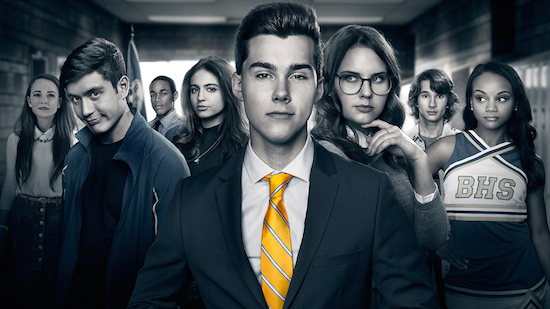
America, more than ever, is the land where any kid can grow up to be president. And the current election cycle has proven you don’t even have to grow up. That premise is taken to its absurd (but no longer illogical) conclusion in Mr. Student Body President, a dark-suited comedy from New Form Digital for the go90 mobile app. The series’ reality bends around Tyler Prendergast (Jeremy Shada), who takes his schoolwide mandate more seriously than some politicians view the Constitution, and himself even more so. Conducting his business in a style somewhere between an overzealous chamber-of-commerce rep and the head of a cartel, Tyler’s only clique is a “cabinet” of similarly self-overconfident student achievers who follow him through the halls like a troupe of Aaron Sorkin cosplayers, and are kept in line by his ruthless “Chief of Staff,” Hadley Pulito (Arden Rose). Shada clenches his role with deranged, irresistible conviction, and Rose is artisanally deadpan and calculating. As Principal Helfrick, Christina Moore gives a comic master class in composed, horrified chagrin as Tyler’s maneuvers marginalize her; Stu James and Bill Weeden are mournfully hilarious as the weary and terminally flummoxed Assistant Principals Ditman and Klemmer; and a note-perfect ensemble wanders in and out of class, especially Jackie Averia as otherworldly dork and puppet Freshman Class President Blair McGunty. As intrigues over pep rallies, smartphone bans, existential athlete/computer-whiz conflicts, robot training-babies and other compelling issues rage, we see the humorous, horrible fable of a microcosmic society doing anything not to move on. I spoke by skype with the show’s framers, Ryan Hunter and Jack Ferry, to check the status of the nation…
HILOBROW: In the pilot from 2014 everyone seems to be swept along in Tyler’s delusions, whereas in the new series the principal and at least some of the students push back against his sense of reality. Did the bizarreness of this year’s politics have anything to do with that?
FERRY: To be totally honest, we weren’t really trying to build a one-to-one allegory for what’s going on in politics today; instead, we thought, what are some of the themes that are going on politically that we can map to the highschool experience. So, a good example of that is in Episode 8, Tyler becomes very paranoid about a senior prank that he’s worried he’s gonna become the victim of, so we kind of map that to the threat of terrorism [laughs], so he tries to ramp up surveillance of people he considers to be subversive. What we’re always trying to do is map to those political themes, but from the highschooler’s perspective. We decided early on that we didn’t want this show to be a one-note parody of what’s going on currently in politics, so you’re not gonna see a Little Trump or a Baby Hillary; we wanted to create a fully developed world that can satirize what’s going on in actual politics, but without drawing any reductive, one-to-one comparisons.
HUNTER: That being said, you can see how the establishment wing of the student council brings in this outsider candidate who ends up coming back to haunt them [Episode 3, “The Protégé”], and you yourself can infer, I’m seeing a version of…
FERRY: …what’s going on with the Republicans…
HUNTER: …but there isn’t any character you can point to and say, this is Donald Trump, this is Paul Ryan, whatever.
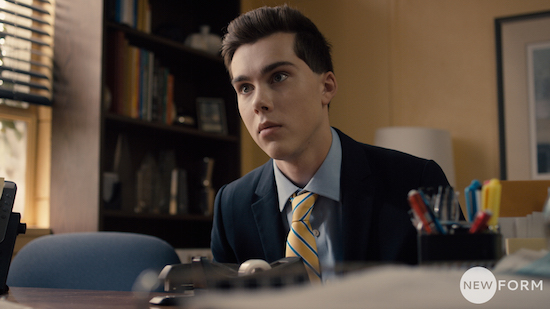
HILOBROW: I think you do a good job of having this all be implicit and referential, like the way the goalposts of reality keep getting moved further out, with each time the principal thinks she’s gotcha’d Tyler and he prevails… it can’t help but feel like an allegory.
FERRY: He doesn’t always prevail, as you’ll see over the course of the 10-episode season, but that’s sort of the fun of the show, throwing these obstacles at this kid, who seems very fresh-faced and friendly to the administration, but who behind the scenes is a real operator; the fun of the show is seeing, how’s he gonna get out of this jam, or will he?
HILOBROW: When you said every now and then he doesn’t prevail, I had a strange flashback from this series’ arc to the original version of The Prisoner [laughs]; this weird contest of wills in a symbolic social setting.
FERRY: That show’s a little more surreal than ours [laughs], but I thank you for the comparison.
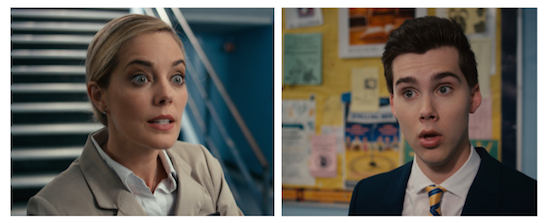
HILOBROW: Talking about this also sparks a memory of something I haven’t thought about in at least 30 years, when a guy who showed up to protest Carter bringing back draft registration with me turned out to have gone to my same highschool with the then-mayor, who this guy said started his political career by stuffing the ballots for student-council president!
FERRY: Ryan’s got a funny story along those lines too.
HUNTER: Which one? [laughs]
FERRY: The one where you sort-of rigged an election after you graduated?
HUNTER: Well… [laughs] I just kind-of could never leave, and even when I was a senior, and I couldn’t run anymore, I would ghost-write younger students’ speeches just so I could stay —
FERRY: — Something you should know is that Ryan was the student body president of his highschool —
HUNTER: The only reason I even ran was because I wanted to give a funny speech in front of everyone, and so when I was a senior I couldn’t do that anymore, there were no more elections, so I would try to svengali sophomores or juniors, just to feel like I won an election in spirit [laughs]; no one would ever find out that I was involved but I just secretly was trying to help people. And that continued into when I was a freshman in college, sadly, because I went back to my highschool to get my older sister’s transcripts for her, and I went to the front office — it was spring break for me — and they said, “Oh, y’know, the student body president election is today; you should go up there,” [laughs] and I said, “Oh, okay, sure.”
I went up to TV Productions where they were filming the announcements. There were these two guys who had been on my student council, so I felt they were running for the right reasons, and then there was a guy who was running on a platform of… robots, or something? He said he was a robot. He was the joke candidate, which really I should have identified with, since I started as a joke candidate, but I was too entrenched by that point. And then there was another joke candidate, a guy named Josh High, whose slogan was “Get High” — and I was like, “this guy can’t take over” — but the robot-guy was late, so they prevented him from recording his speech. And I went to the student council advisor and I said, “Don’t you see what’s goin’ on, you’re gonna split the votes between your two guys and Get High over here; you gotta let the robot-guy in!” And she says, “Oh, it’s too late, the TV Productions lady is gonna be mad if we re-record” or whatever, and so I had this moment where I was like, “Look, I was in TV Productions, I know how to run that equipment, let’s just do it live.” And she was like, “Well the principal will be furious ’cuz he doesn’t let us do anything live anymore” — he was a very Helfrick-like character who cracked down throughout my senior year when he came in, and continued to. So I said, “Don’t worry about it, we’ll do it live, he’ll never know.” And so, I went around, and I start pulling people back out of class; I got the student-council person who asked the questions, and I got the robot-guy, and I assembled them, and — y’know, I don’t even go to this school anymore, and I’m running the TV Productions equipment, and this is all just so I can get this robot-guy on the ballot, so that he can lose —
FERRY: He can split the vote of the joke candidates —
HUNTER: Yeah, Get High and the robot-guy will cancel each other out, that was the whole goal, just to achieve a level playing field. I shouldn’t have been meddling or doing any of this, but… it ended up actually working, which I thought was redemptive in some way, because the election I tried to rig before I left the school completely failed. [laughs] And I was like, “Y’know, I am rigging this election a little bit, but I’m doing it for the right reasons.”
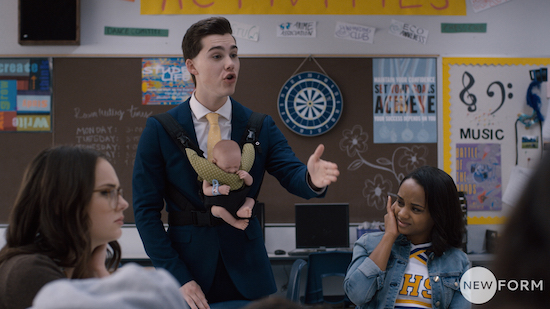
HILOBROW: Wait, did you describe the election you tried to rig while still in school?
HUNTER: I didn’t, but that’s another long story…
FERRY: Just suffice it to say, a lot of what goes on in this show is born from autobiographical stories, and then what we try to do… early on in the process, Ryan and I actually travelled to a couple highschools, what we called research expeditions, and with the help of the Development staff at New Form, they were able to put together some meetings with classrooms, and principals, and we were actually able to sit in on a couple classes, and just talk to some of the students and be like, “What’s it like being a student today,” because we wanted to take the experiences that Ryan and I had in highschool and map them to what’s going on in politics today, but we also wanted to know, what’s it like being a student now, because when Ryan and I were in highschool, our lives weren’t as dominated by cellphones, and apps, and social media the way they are now —
HUNTER: It didn’t exist.
FERRY: And if it did, it was early stages of stuff, like AOL instant messenger, and text messages and stuff — it wasn’t like it is now.
HUNTER: And we weren’t doing that in school, all day.
FERRY: These kids are; so that was the really important thing for us, how can we take these things from our real lives, that inspired us to want to make the series in the first place, as well as the stuff we’re ripping from the headlines, but how can we make this as “now” as possible.
HUNTER: Because in order for us to be able to really comment on anything that’s going on in the world right now, it needs to not feel like a period piece, it needs to feel like it is happening now. So that research we did… I was surprised by how many of those conversations actually made their way into the show.
FERRY: I was too. So much of those things, which we were just juggling around in the writers room, ended up in the final cuts of the episodes, which was really fascinating.
HUNTER: One example, which you’ll see in Episode 3, was, we asked these students, “Has anyone you know ever gone viral?” even on a low level, like they put something online and everybody knew about it. So, at one school it was, “Oh yeah, this one girl, she put a condom in her nose, and everybody saw it!” And we were like, ugh, that’s [laughs] horrifying, and then we went to another school, asked the same question, and they go, “Well yeah, there was this one girl who ate a tampon, and,” [laughs] “everybody saw it.” We went, “WHAT is going on”; there was something so… disturbing, yet perfectly, juvenile highschool, but —
FERRY: We kinda felt like, is it real, were they putting us on, and then we went home we did some research, and it turns out that both of those things are a thing. [laughs] And we told these stories in the writers room, and I don’t think any of us ever thought that those stories would make it into the show, but they very directly made it into the show.
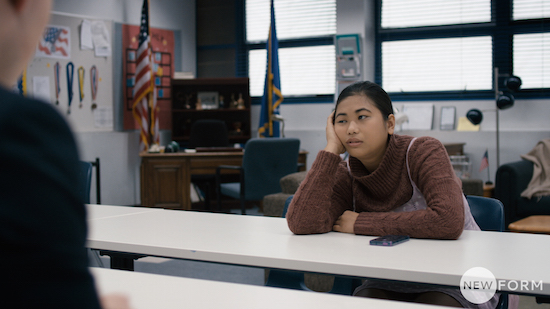
HILOBROW: I had been wondering how you keep a show like this topical — with high production values and actual human beings you can’t be like South Park, which is known for turning in episodes the day they air…
FERRY: We were having many a handwringing discussion about, whether a character should be riding on a hoverboard, will hoverboards still be A Thing when this show comes out? Should we be putting in a reference to “Netflix and chill,” will that still be a reference, months from now?” Because that’s how quickly the world moves now. So the idea that we would be able to make some sort of commentary on the latest gaffe by such-and-such a candidate, we can’t even begin to do that. Whereas, making a commentary on “the war on terror,” or on the idea of who’s patriotic and who isn’t, and what happens when you map “patriotism” to school spirit, those are themes that I feel like will resonate beyond just this election cycle. So in a way, I think that was good, because it forced us from being this very transparent parody of what’s going on in politics, and instead trying to create a richer, deeper world with real characters.
HUNTER: And yet, because a lot of the topics are somewhat evergreen, the hope is that, no matter when you watch it, you’ll potentially be able to see a mirror of whatever’s going on in politics at that time, because it never really, truly changes; it’s a lot of the same themes.
FERRY: I also look at the series, or at least this season, as sort of a time-capsule; this is what it was like to be in highschool in 2016. I don’t know that people are gonna be using Snapchat or hashtags two years from now, but that’s okay, because it feels current now, and if you watch it five years from now, you’ll still be able to appreciate it in the same way you can appreciate a spy-thriller from the ’60s.
HUNTER: Episode 9 is probably the most au courant of the episodes with the technology —
FERRY: “The Dark Ages,” where the cellphones were taken away?
HUNTER: Yes. And we’re shooting it in March and it’s coming out in September and we’re going, “Are people still gonna be using Snapchat when this comes out?” But when we did the premier the other night [Sept. 22], when we showed Snapchat in the girls’ bathroom, it got an applause break [laughs].
FERRY: So thankfully, that dog-filter is still in effect. We also got a great laugh on the Netflix-and-chill joke, so I was very heartened to hear that. [laughs] We almost felt bad for writing it, we kinda threw it under the bus, by having a character say “I can’t believe she actually said ‘Netflix and chill’” — that wasn’t necessary. [laughs]
HUNTER: We were just trying to cover our bases…
FERRY: Well there are people who say that, that “Netflix and chill” is now a passé thing to say, or riding on hoverboards is no longer cool…
HILOBROW: Now things do move so fast that if people can’t be the first to do something, they want to be the first to be the last. To declare what’s over.
FERRY: [laughs] Yeah, “I’m the one who put the nail in the coffin on that one, guys, it’s done now, thank you.”
HILOBROW: In the way that you’ve said certain issues are perennial or unchanging, with “The Dark Ages” you hit on a persistent modern myth, which most recently has taken the form of The Electromagnetic Pulse, about how would we survive without all the gadgets we depend on. So episodes like that are built to last.
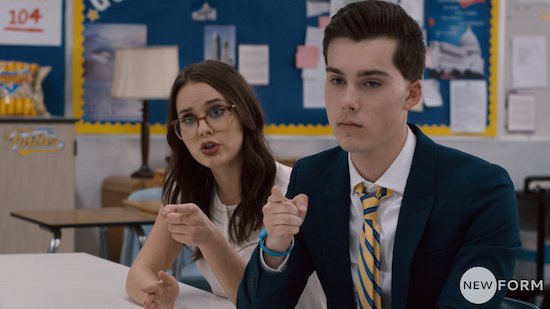
HUNTER: And again, someone could watch that episode and they could say, “I’m feeling like there are shades of the Arab Spring in here somewhere,” but you don’t have to have that interpretation to enjoy it. We didn’t tether ourselves to current events.
HILOBROW: What’s also made to last is the bubble that Americans traditionally are in — you could interpret the assistant principals’ obsessive reading of students’ tweets as an analogy to the NSA, etc., but nobody in the show is fully aware of how anything that happens to them connects to reality…
FERRY: We had a lot of conversations about “building the bubble.” What’s fun about the show is this idea that these characters are all taking these politics very seriously, [while] in the real world politics is serious, because there are actual ramifications. The moment you pop the bubble of that world, when you have a character who’s saying. “Y’know, guys: highschool doesn’t matter,” that’s the threat of losing the fun of the show. That’s largely what the principal is there to do, to at least ground that world in reality, where at least you have some sane person saying, “Look, this is still just highschool, don’t get caught up in it.” And then even she, by the end of the season, gets pulled in. That’s what’s fun about it.
Once you start bringing in the “real world” — if we have characters that are sad because they lost the “cool table,” that’s funny; if you’ve got characters who are sad because their parents were deployed to Iraq, all of a sudden the rest of this political infighting isn’t as fun anymore. We were very careful about not having anything that even has shades of Columbine or school shootings, because the moment there’s an actual, real-life, threatening thing that pops that bubble, then all of this feels insignificant. There is that parallel of how a lot of Americans don’t really look at the wider world around them, and that’s how you end up getting in these echo-chambers of pundits screaming at each other over the silliest, most trivial of things. And that’s the stuff we’re interested in, because that’s the stuff you can really mine for comedy gold.
HUNTER: I also think there is something real and grounded about it, because when we did talk to freshmen in Santa Ana, California, not one of them knew what a Democrat was, or what a Republican was. But they all knew Donald Trump. And they knew that Donald Trump wants to deport their families, a lot of them. At least, this was their perception. And I kinda thought, “These guys are a step above where my friends were when we were 14.” Because I would bet you that we couldn’t have defined Liberalism vs. Conservatism, or what a Democrat or a Republican is, but these guys know who’s running, and this was October of 2015 — they knew this a year out from the election, which is ahead of the curve based on where my peers were. But you do see how they live in this bubble, like highschool is the world to them. So that’s what we wanted to portray.
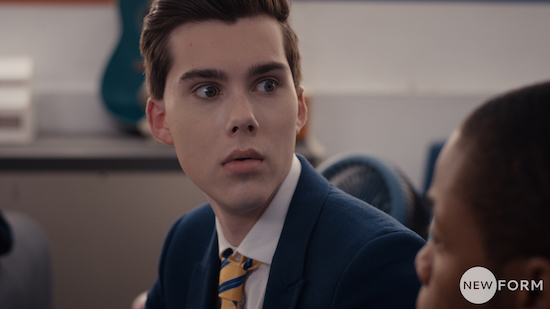
FERRY: Their concerns are, homework, their Facebook pages being monitored… they’re all very concerned about food. Food plays a big part in this season, because we [adults] forget, being in highschool so much of it is about, y’know, “When is lunch?” and “What are we eating for lunch?” and the sort of currency of food. And just, how much of your day is spent staring at a clock and being bored. And that’s how you end up getting caught up in this, sort-of, Game of Thrones of everything [laughs], because there’s nothing else to do.
HUNTER: It’s your whole world.
FERRY: You’re stuck here. A lot of highschools in America were built by the same company that also built prisons. And there’s an institutionalized sameness to these buildings; when you go into one, they seem very similar. And there’s a lot of parallels in a show like this to shows that take place in a prison — these internal politics of people who are stuck in this bubble because none of them can leave. So you get caught up in this little world — “it might be a little pond, but, if I’m gonna be in it, I’m gonna be the big fish.”
HILOBROW: Yeah — analogous to either prison dramas, or, something like Snowpiercer.
FERRY: [Laughs] Yeah, enclosed little systems that create hierarchies. Who’s going to be elected Homecoming Queen seems very important at the time, but with a little bit of distance you’re able to laugh at it, and that makes for a good combination when you’re writing a comedy.
HILOBROW: It’s refreshing how the teen years (and teens) aren’t idealized on this show.
FERRY: “Is everyone in this highschool crazy?” was the question posed in the writers room. And I was like, “No, it’s not that”; it’s just that, Tyler has this very extreme point of view, and I look at him as like this lemon-drop, and the school is like a bucket of water; when you drop the lemon candy in the bucket, it’s gonna diffuse to the water around it, and the closer you get to that lemon-drop, the more lemony it’s going to be [laughs], and farther out it’s still gonna be affected by him and his presence.
HUNTER: We very much viewed him as Patient Zero, in terms of how insane things get in the school. His megalomania creates a chain reaction at the beginning of the season that, at the end of the season, even though the students may not be aware of it, they’re participating in this insane narrative that ultimately traces back to him.
FERRY: I think that’s true of a lot of schools. If you’re in a highschool with a star athlete who’s gonna become the next LeBron James, the culture of that school is really gonna be defined by basketball, where maybe it hadn’t been six years previous or six years after. There is a tendency when these big personalities come up, that it changes the dynamic of the entire school. And of course there are gonna be some kids who don’t care at all about sports, and are actively anti-basketball let’s say, but their reality in that highschool is going to be affected.
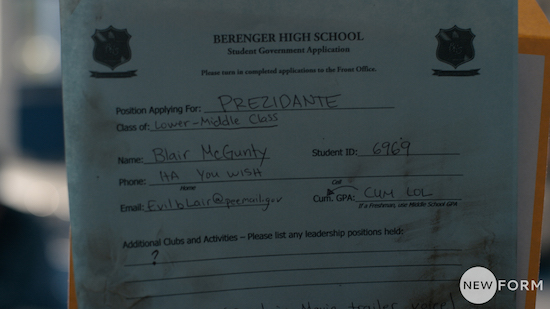
HUNTER: Any society or reality we experience is really just based on an unspoken agreement we have with each other — “Oh, this guy’s got all the status? Well he’s really acting like he should [laughs], I guess this guy’s in charge,” and then everyone just kind of falls into line.
HILOBROW: They’re repositioned. In the way that, ever since Reagan, what had been considered issues at the center were shifted to the left, and what had been far-right was moved to the center, with all light refracting around this one guy.
FERRY: He’s a great example of someone who reframed the conversation in such a dramatic way that the entire bubble of the country was inexorably shifted; whether you liked it or not, everything was now seen through this new lens.
HILOBROW: Speaking of personal ambition, Ryan, when you were doing all of this running for student office and manipulating elections, were you at the time interested in politics, or just the kind of platform you now have as comedian, writer, etc.?
HUNTER: No, I wanted to get on stage and do speeches and sort of monopolize the amount of attention I could get as a 17-year-old crazyperson. [laughs]
FERRY: You were sort of a prankster.
HUNTER: That’s true; I surmised that there was this prison mentality, so I just wanted to make highschool as fun as it possibly could be, and I think you see that in Tyler to some degree. Because, it’s kind of like, if people are going to school and they’re miserable, that’s not really a kingdom worth ruling over.
In my mind, he isn’t someone who imagines himself going off and running for Congress and one day becoming President, because he’s not even thinking of that outside world; to him, he already has become President. There is no plan to do anything outside those four walls.
He actually wants everything to matter to everyone else, and he wants everyone to be, y’know…exited to go to highschool every day [laughs], whereas I don’t think [Principal Helfrick] cares; she wants everyone to be… productive, and…
FERRY: She wants them to think beyond highschool. There’s no reason why you can’t have both; think about the future but also allow for freedom and fun in the meantime, and I think that push-pull dynamic is really essential to the conflict that’s central to the show, in order for us to have the most fun with it.
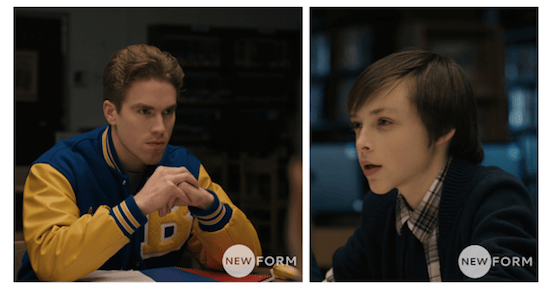
HILOBROW: The conflicts are mapped out well, with these nation-states of after-school clubs and athletes and computer wonks…
HUNTER: We definitely did look at them less as social cliques and more like tribes with ancient grievances against each other.
FERRY: Early on, I said “I want the ‘cool table’ to be like the Gaza Strip” [laughs] — that’s why you hear a lot of this, sort-of Arabic-inspired music in that episode, because I want it to feel like these historical, ancient enemies, the athletes and the smart kids, have been warring over this tiny piece of real estate for centuries, and it’s when you elevate it to that level is when it gets really funny, because, y’know, we’re also talking about, a lunch table. [laughs]
HILOBROW: Is there anything we haven’t covered?
FERRY: The only thing I will say is this: You can download and watch the show for free, and you don’t need to be a Verizon subscriber to get the go90 app. [laughs] That’s what I get asked more than anything else.
HILOBROW: Thank you; which content is proprietary and which is free is one of the most pressing questions of our times!
New episodes of Mr. Student Body President are streaming every Thursday here.
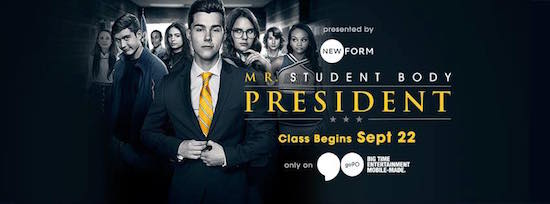
MORE POSTS by ADAM McGOVERN: OFF-TOPIC (2019–2025 monthly) | textshow (2018 quarterly) | PANEL ZERO (comics-related Q&As, 2018 monthly) | THIS: (2016–2017 weekly) | PEOPLE YOU MEET IN HELL, a 5-part series about characters in McGovern’s and Paolo Leandri’s comic Nightworld | Two IDORU JONES comics by McGovern and Paolo Leandri | BOWIEOLOGY: Celebrating 50 years of Bowie | ODD ABSURDUM: How Felix invented the 21st century self | CROM YOUR ENTHUSIASM: C.L. Moore’s JIREL OF JOIRY stories | KERN YOUR ENTHUSIASM: Data 70 | HERC YOUR ENTHUSIASM: “Freedom” | KIRK YOUR ENTHUSIASM: Captain Camelot | KIRB YOUR ENTHUSIASM: Full Fathom Five | A 5-part series on Jack Kirby’s Fourth World mythos | Reviews of Annie Nocenti’s comics Katana, Catwoman, Klarion, and Green Arrow | The curated series FANCHILD | To see all of Adam’s posts, including HiLo Hero items on Lilli Carré, Judy Garland, Wally Wood, and others: CLICK HERE
